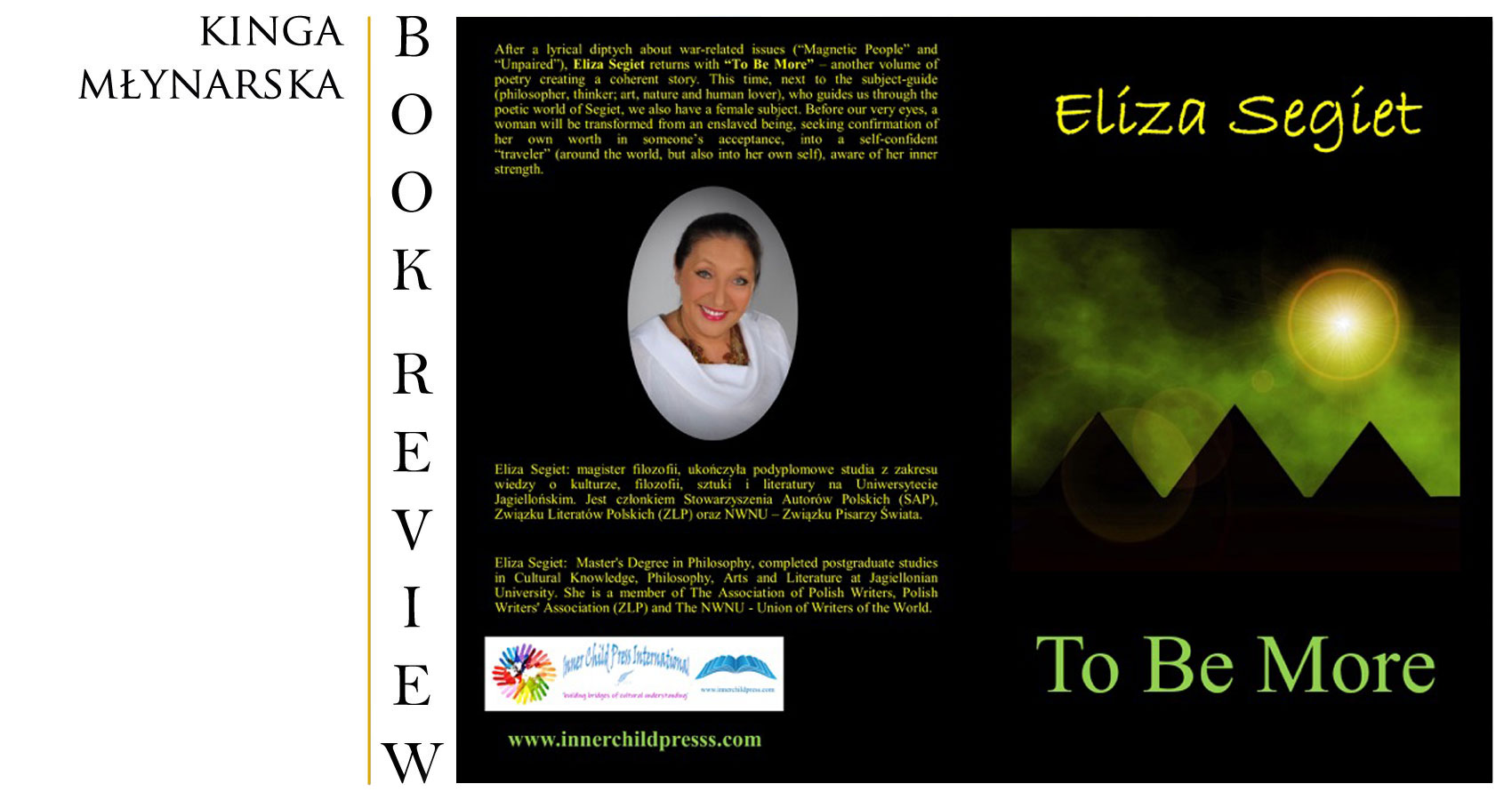Review of Eliza Segiet’s ‘To Be More’
written by: Kinga Młynarska
translated by: Artur Komoter
After a lyrical diptych about war-related issues (“Magnetic People” and “Unpaired”), Eliza Segiet returns with “To Be More” – another volume of poetry creating a coherent story. This time, next to the subject-guide (philosopher, thinker; art, nature and human lover), who guides us through the poetic world of Segiet, we also have a female subject. Before our very eyes, a woman will be transformed from an enslaved being, seeking confirmation of her own worth in someone’s acceptance, into a self-confident “traveler” (around the world, but also into her own self), aware of her inner strength.
“To Be More” can be read as a biography of a woman put through fate. Liberated from a toxic relationship, she slowly stands on her own two feet. She gains awareness of her body, her value and her own abilities. Loneliness disturbs her, because she had surrounded herself with her loved ones before; she gave her whole self to her partner, children, friends. And now the time has come when she was alone. Love turned out to be a lie, many friendships – an illusion. Paradoxically, this overwhelming loneliness allows the subject to take a fresh look, to assess her own life from a distance. The woman knows that time does not work in anyone’s favor, that with age, more and more things limit us, therefore she does not delay and takes matters into her own hands: she wants… to be more.
Although there is no clear (even graphic) division, we can distinguish two parts of this lyrical story. In my view, the latter begins with the poem “New Opening”, where the woman (subject-heroine) sets out on a journey of the lifetime. From that moment, Segiet shows us a number of lyrical postcards. However, in addition to attractive places and hypnotic landscapes, the poetess also indicates what is happening in the background of these landscapes. In addition to natural exhibits, historical trails or artifacts, tourists can also see these contemporary, shameful monuments of their own stupidity.
An important topic in “To Be More” is the opposition of truth – deceit. The poetess condemns all manifestations of lies – including all pseudo-creators who rely on someone else’s achievements (no shadows have monuments erected) or cheaters using others to gain some benefits (false friendships). She also notes that hiding the truth can be a very complicated phenomenon (e.g. dictated by shame or fear). Segiet is also aware that the modern world, more and more virtual, is conducive to such a model of life (including assuming an identity depending on the circumstances). The author is troubled by the loss of all values that have their source in the Greek moral canon (good, beauty, truth).
The author of “Voiceless” raises a lot of important issues in this volume. She speaks about equality (not only in feminist terms) and omnipresent ignorance, e.g. in matters of ecology that leads us to self-destruction, and draws attention to, for example, our passions for which life is risked, and to creative activities, but also copying (to be the brightness or the reflection?), interpersonal relations (e.g. lack of interest in the elderly), to the attitude of people towards animals and nature in general (for animals, the human is death / for the human / – the animal is life). The poetess also notes the disappearance of ambition and values in contemporary people, indifference to the problems of others (e.g. in Third World countries).
There are also typical themes of Segiet’s lyric poetry, such as love (from different angles), the passage of time, philosophy and the Human with all their imperfections, ills, fears, but also desires, successes. Human who learns forever, tests their own abilities, crosses borders and is constantly on their way to (self)knowledge.
Eliza Segiet’s poetry resonates with the voices of people who are silent every day for various reasons. These include victims of persecution, domestic violence, the disabled, people with low self-esteem, the deceased, etc. The poetess gives voice to their lyrical symbols, believing that literature has the power to influence the readers, that she can stop and force them to reflect. However, Segiet speaks not only on behalf of people, but also bows over what does not have this voice at all – generally speaking, over nature (an important, though only signaled, motive for caring for the environment).
The world of Segiet’s values is articulate. The poetess, like her female subject, becomes an advocate of peace, equality and love. There is no place for false promises, accidental blows or a Human-hunt. The poetess is in favor of love, because she sees in it the sources of happy symbiosis between people and what surrounds them. To love another person – so little, but too much for some. To love yourself and love the space we move in – this is probably the most important message from “To Be More”.
- Review of Eliza Segiet’s ‘To Be More’ - May 15, 2021
- About Eliza Segiet’s Unpaired - February 13, 2020
- About Eliza Segiet’s Magnetic People - January 8, 2019



